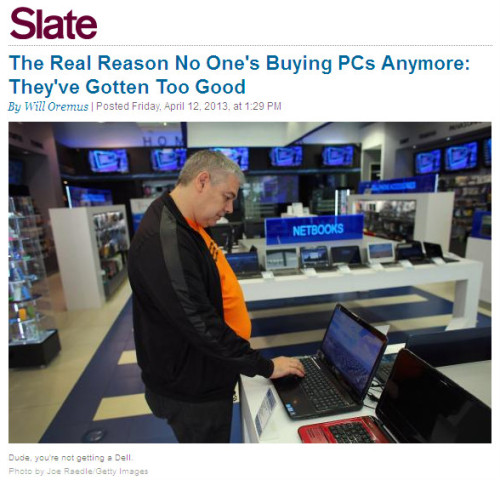Slate: PC sales suffered their steepest decline in history last quarter, plummeting 14 percent worldwide, according to a report from market research firm IDC. As the Statista chart below shows, the malaise hit every major manufacturer except Lenovo, whose sales were flat. HP and Acer had the steepest drops.From what I’ve seen and heard, the second theory is the most popular with the media — probably because it’s the easiest to explain, not because it’s the truest. In fact, it turns out that both theories are wrong:
Why is this happening? There are two prevailing theories. One is that it’s Microsoft’s fault. Historically, when Redmond releases a new version of Windows, PC sales spike as people upgrade their machines to take advantage of the fresh software. But with Windows 8, that hasn’t happened. That may because the radical redesign is confusing. A year ago, my colleague Farhad Manjoo predicted, “You’ll hate Windows 8.” Some analysts speculate that people may even hate it so much that they’re resisting buying a new machine just to avoid it. There may be some truth to that. We’ll know more once Apple releases its quarterly earnings on April 23.
The second theory for PCs’ sales decline is that, in short, the PC is dead. The media say this at least a couple times a year, and the latest wave of pronouncements includes obituaries from Salon and ReadWriteWeb. The idea is that, with people doing so much computing on their smartphones and tablets these days, they have no need for their old workhorse desktop or laptop anymore.
In the past, you had to replace your computer every few years or else it would become hopelessly bogged down trying to deal with the latest desktop applications, operating systems, and Internet technologies. But thanks to Moore’s Law, your average PC’s processing power now exceeds most people’s daily needs by a healthy margin. Meanwhile, the rise of the cloud has reduced the need for extra memory. And as ZDNet’s Simon Bisson explains in depth, a strategic shift by Microsoft in recent years has meant that you no longer need to buy a new machine in order to take advantage of each new operating system. The result is that PCs have become more durable than smartphones and tablets, which are still puny enough in their powers that you have to upgrade them regularly.It isn’t that the days of the PC are over, it’s that the days of the disposable PC are over. People aren’t replacing their machines as often, because they don’t need to. The story the press has been repeating for months is BS.
Once again, the buffalo herd mentality of the media steers everyone wrong.






